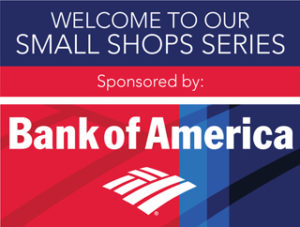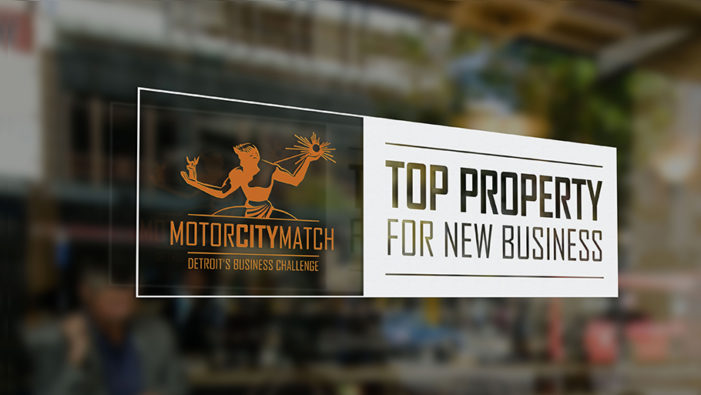All Jevona Watson really wanted was to see a new coffee shop open its doors in her neighborhood.
A resident of the Bagley community near Livernois Avenue and McNichols she could’ve started an online petition and invited any of the well-known java chains to the area. She might even have looked into becoming a store franchisee, but Watson had something else in mind – her own small business.
With $35,000 in support from Motor City Match, a public-private program for entrepreneurs, Detroit Sip was born.
“It has totally transformed into so many things that I didn’t imagine, and Motor City Match was the catalyst in the beginning,” says Watson.
Motor City Match is winning praise from entrepreneurs and property owners for its success in converting unused buildings into small businesses.
Launched in 2015, the initiative has invested $3.4 million to 74 grant winners. In both District 2 and citywide, the program has led to the opening of 18 small businesses with another 20 under construction.

Detroit Sip has gained notice as one of Motor City Match’s biggest success stories, even earning a mention by Mayor Mike Duggan at the annual Mackinac Policy conference.
Operated through the Detroit Economic Growth Corp. (DEGC), Motor City Match has drawn praise for its significant work in helping make visions like Watson’s a reality.
The effort is earning a reputation as a game-changer, particularly for its impact on diversity in Detroit-based businesses. Of those getting funds, 78 percent are minority-owned businesses, 69 percent women-owned businesses, and 55 percent minority-women-owned businesses. More than 60 percent of Match-supported enterprises operate in Detroit.

“Motor City Match helps provide access to capital by helping entrepreneurs understand how to access it through business trainings and by walking the participants through an actual loan application process,” Askew says.
Small business owners complete a commercial loan application, which is then accepted by any one of the program’s five active lending partners, including Detroit Development Fund (DDF), Invest Detroit, Michigan Women’s Foundation, Detroit Local Initiatives Support Corp. (LISC) and Capital Impact Partners.
Through a partnership with the City of Detroit and the U.S. Department of Housing and Urban Development, the Match program awards a half-million dollars in grants every quarter and has helped generate $20 million of additional investment since its formation. Other District 2 awards have helped reinvigorate Livernois Avenue by supporting Narrow Way Café, Social Sushi, and Blessed and Highly Favored, a juice bar.
Along with business owners seeking operating space or support for improvements, applicants can include building owners looking to lease to entrepreneurs, or beginning to renovate buildings, in preparation for new commercial tenants. Having helped almost 300 entrepreneurs find commercial locations, Match is also helping to erode the landscape of Detroit’s vacant structures.
“On the business property side,” says Askew, “we’ve concluded that when a property can accommodate multiple businesses, it can have a more significant impact on the commercial corridor. We promote the availability of our programs through signage and the more visible the locations are the better.
“We believe it takes two examples of a renovated space in any one commercial strip to begin to turn around public perceptions of an area,” he says.
Motor City Match scrutinizes not only its applicants’ vision, it factors dreams into Detroit’s consumer reality, Askew says. During each advancing round of competition for grants, program officials consider market studies, and demand for products and services proposed by prospective business operators. An enterprise’s benefit to the community it will serve is also weighed during the process, but there’s “a steep learning curve for many start-ups” after they win grants, he adds.
“Small business owners are not usually familiar with navigating the city’s permitting, zoning and licensing processes,” says Askew. “Identifying qualified contractors who are readily available to do the work is a challenge, with so much going on in the city, and it’s becoming increasingly difficult to find general contractors who can complete work according to the business owner’s timeline.”

The Match program works through DEGC to help businesses identify qualified suppliers and contractors, while providing other support.
“Motor City Match puts a premium on offering technical assistance to applicants. Each quarter, in addition to the monetary awards, MCM enrolls about 50 participants in free business planning courses and free architectural and permitting assistance for businesses that have significant renovations for newly secured tenants,” adds Askew.
Refining the program and expanding it to better contribute to the success of small business is a goal.
“Motor City Match is continually improving our services based on data we’re collecting from program participants,” says Askew. “We will probably add a mentorship program to our menu of services in the next round.
About Motor City Match:
Motor City Match is a unique partnership between the City of Detroit, the Detroit Economic Growth Corporation (DEGC), the Economic Development Corporation of the City of Detroit (EDC) and the U.S. Department of Housing and Urban Development (HUD). Competitive financial assistance is supported by a broad partnership of Southeast Michigan community development financial institutions, foundations and corporations.
Editor’s Note: TheHUB’s Neighborhood Economic Development Director Rob Dewaelsche contributed to this article. To learn more about Motor City Match visit motorcitymatch.com.
To learn more about our Small Shops sponsor Bank of America’s many programs and resources for small business owners visit: https://www.bankofamerica.com/smallbusiness/business-financing.go

See more of TheHUB’s #LiveLoveDetroit coverage on District:
More reasons to #LiveLoveDetroit
Making Magic: Former Fairgrounds is site of $1 billion vision
Citizens organize around former Fairgrounds’ future
Stop the presses: Fitzgerald project publicity must wait on results
Breaking Barriers: University strives to meld campus with community
Matchmaker: Motor City Match builds dreams in District 2 and citywide
A Sip of Success: Café aims to bring residents, students and businesses under one roof
Celebrating a Century: Sherwood Forest turns 100
Partners for Progress: Teamwork guides multi-million-dollar neighborhood fund


